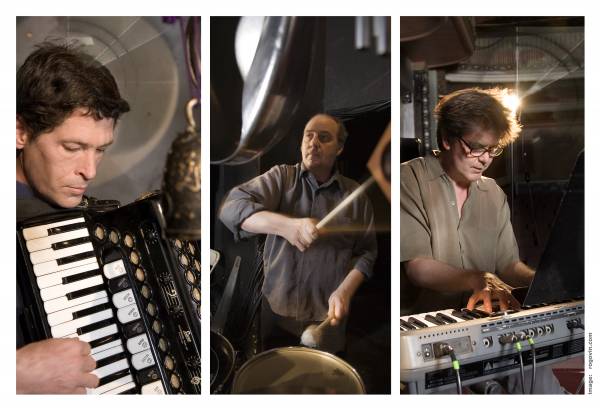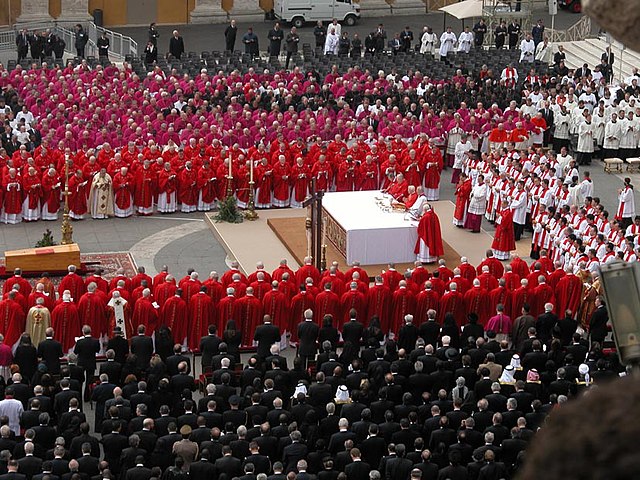When Alloy Orchestra first agreed to compose and perform a score to accompany the 1926 silent film “Metropolis” for a series of showings over a long weekend in 1991, they had no idea where it would lead. That said, it didn’t take the three man ensemble—now consisting of percussionists Ken Winokur and Terry Donahue, as well as keyboardist Roger C. Miller (original keyboardist Caleb Sampson passed away in 1998)—long to realize that they might have stumbled onto something big.
But the story of Alloy’s long relationship with Fritz Lang’s “Metropolis” really began several months before, on New Year’s Eve, when Alloy performed a show using a gigantic “drum set” built from several tons of junk, a behemoth version of Alloy’s now-signature instrument, “the rack of junk.” It was based off of that performance that Alloy was offered the “Metropolis” job, and no wonder they were. As noted by Winokur, who also serves as Alloy’s director, “there are some scenes in [Metropolis] that look almost exactly like our drum set.”
Despite being one of the most well-known and acclaimed films of the silent era, the widely available version of Fritz Lang’s “Metropolis” in 1991 was Giorgio Moroder’s highly controversial restoration, which was color-tinted and featured a rock music score. “Some people loved it, most people absolutely hated it,” said Winokur. A local film programmer wanted to show the film without the controversial score and contacted Alloy.
Looking back now, Winokur recalls that even before that first performance, “we had a little inkling that this was special.” Between 50 and 75 people attended that first performance, but by the end of the weekend they were selling out the 600-seat theater. Now, after 25 years and over 500 performances of four different version of “Metropolis,” not to mention the hundreds of other performances of the 30 other silent film scores Alloy Orchestra has composed, that inkling has more than proved correct.
“In order for a contemporary audience to enjoy these films, it’s really nice to have the music be sort of a bridge between 90 years ago when the film was made, and contemporary audiences, and we think of ourselves as that bridge,” said Winokur.
But while they serve as a bridge for modern audiences, Winokur said they don’t consider their sound to be specifically modern: “We write music that’s sort of unmoored from a time. We don’t write in the style of the 1920s, but we don’t write in the style of the 2010s either. We write music with odd orchestration that could kind of vaguely fit in almost any time period. We’re more concerned with making sure that the mood of the music actually fits the picture than trying to fit into a specific time period.”
But things did not take off immediately. During the first year or so, Alloy never really made it past Boston. Recalling those early days, Winokur joked that their performances took them “from the Coolidge corner all the way to the MFA.”
About two years after they started working with silent films, a call from Telluride Film Festival changed everything. A prestigious annual festival that takes place in Telluride, Colorado where films such as “Juno” and “Brokeback Mountain” have premiered, Telluride also always features silent film screenings with live musical accompaniments. This year in particular, they were looking for a percussion-oriented orchestra to do a score for the 1924 German silent film “New Year’s Eve” and felt that Alloy fit the bill.
Winokur and the others realized this was an opportunity unlike any they had had in their careers before: an actual long-term job. Their Telluride performance was a major success, and since then they have been repeatedly re-invited to the festival.
“It became a job. We now play all over the world,” said Winokur.
Though they have worked with numerous other silent films since—they try to limit it to one new film a year, so they can properly focus on it—“Metropolis” has remained a constant presence. Since 1991, multiple new restorations of “Metropolis” have been released, featuring rediscovered footage that previously had been considered lost, and each version required Alloy to modify their score. In particular, the latest restoration, released in 2010, required “an absolute re-scoring” to accommodate the considerably fleshed out, modified storyline and new characters. But, as far as Winokur is concerned, the work put into their fourth “Metropolis” score is well worth it: “We are absolutely convinced it’s our best; it took us, I think, twenty years to get it perfect.”
Alloy Orchestra will perform their live accompaniment of “Metropolis” at a screening next Sunday, Feb. 28, at 3 p.m. in the Jewett Arts Center Auditorium.
Photo courtesy of Rogovin.com




